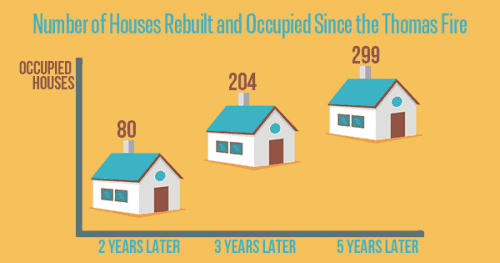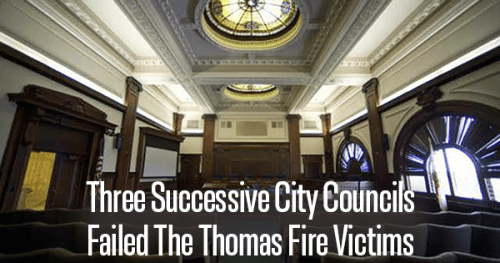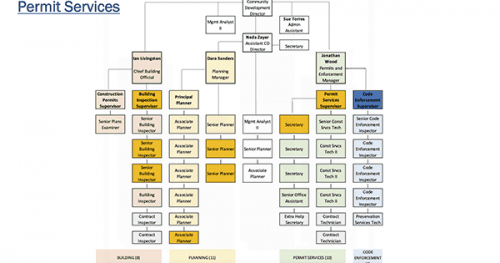The 5-Year Thomas Fire Anniversary: Still Not Ready for Another Disaster

December 4, 2022, marks the fifth anniversary of the Thomas Fire, and many issues are still unresolved. What has the City of Ventura learned since the catastrophe? Are we safer? Are we better off? What has changed because of the fire? Did the city government fulfill its commitment to the victims?
These are difficult but necessary questions to answer. So, let’s look at what transpired after the disaster.
Indeed, it was Ventura Public Safety’s finest hour. Not one person died in the City of Ventura during the fire. Also, Ventura Police and Fire safely evacuated 27,000 people. Truly remarkable.
Yet, what happened next at the city government level undid these extraordinary efforts.
A Brief History Lesson

2017 was not the first time that the hills of Ventura were aflame. On September 26, 1970, the Ventura Hillside caught fire in the precise location where, later, builders developed the Ondulando and Clearpoint subdivisions. Twenty-six years later, the hills erupted in flames behind City Hall near Grant Park on October 26, 1996.
Wildfires are not new, yet two things were different with the Thomas Fire. First, more houses were in the fire’s path; so, the property damage was more significant than in the last two fires. Second, the city government’s response to the disaster varied from the two previous fires.
When it comes to the Thomas Fire, other factors contributed to the destruction of over 500 homes. Failure of the water generators at Ventura Water and the role of Southern California Edison played a part. Insurance companies and the courts will settle these contributing issues. We won’t address them here. Instead, we’ll concentrate on the actions of the City Council and how Ventura delivered services to the victims.
Where We Are On The 5th Anniversary
In 2017, the City Council promised victims the city would do everything possible to return them to their homes quickly. Ventura Community Development Director Jeff Lambert said

On the fifth anniversary of the Thomas Fire, only 299 families out of 535 have returned to their homes. That’s a mere 55.9% of the victims back home. Another 70 rebuilds are in process, and 39 more are in the plan-checking phase. The owners of the remaining 127 homes may not rebuild for various reasons. They include:
- A lack of adequate insurance to pay for the rebuild
- The owners moved out of the area
- The owners chose to keep the lot vacant until they either sell it or have the funds to rebuild in the future
- The owners are searching for an architect or builder to help
All residents should ask themselves, “How can this be?” Is this what the City Council meant by returning victims to normal quickly?
Did Ventura Fail The Victims?

Soon after Ventura Fire extinguished the blaze, concentration on recovery waned. Whatever new “emergency” came before the City Council held their attention. Concentration on the recovery waned. The City Manager lost focus, and the successive City Councils allowed him to be unaccountable.
Focusing on what was immediate (the new issues) rather than the essential needs of the victims rendered homeless had a negative impact. Several examples illustrate how the City Council worked against the rebuilding process.
Inexperienced Leaders For The Thomas Fire Recovery
After the fire, Community Director Jeff Lambert left the city. Unfortunately, several other seasoned Community Development employees left, too. The departures decimated the department most critical to returning victims to their homes.
Community Development was leaderless while Mr. McIntyre sought a replacement. Finally, he settled on Peter Gilli, someone with no prior experience in a similar role. To compensate for Mr. Gilli’s inexperience, Mr. McIntyre layered on another level of bureaucracy. He appointed Assistant City Manager Akbar Alikhan to supervise Mr. Gilli., although Mr. Alikhan didn’t have experience in disaster recovery.
Delaying Thomas Fire Rebuilding Ordinances
The City Council added to the delays as they kept waffling on second-story height restrictions for rebuilding victims’ homes. The Council’s indecisiveness delayed the rebuilding process for many. Councilmembers attempted to please some fire victims wanting to improve their homes and, by doing so, delayed rebuilding for everyone.
Digital Subjugation Through The Permitting Process
To compound the victims’ woes, along came COVID-19 forcing Ventura City Hall to close. As a result, all rebuilding projects moving through the Community Development Department halted while the city scrambled to find a way to keep the government operating.
In a rush, though, mistakes happened. In the most egregious one, over a dozen plans submitted and in process under the old system disappeared when the city moved to the new online system. Weeks later, Community Development corrected the mistake, but the error further delayed the homeowners involved.
Under the new system, the only acceptable inquiries about the status of projects were by email. The system provides an email acknowledging the receipt of the plans upon submission. Yet, there is no way to track a project until a “reviewer” accepts that project into the system. A project is only recognized in the system after someone assigns it to a reviewer. Depending on how long it takes to choose a reviewer, the plans could languish for days. As a result, the system delayed many applications in the early days.
Revelations At The Thomas Fire Situation Review

The City Council reviewed what happened during and since the fire two years later.
The presenters brought to light several disturbing facts during the report. Chief among them is that Ventura is no better prepared today for a natural disaster than in 2017.
Ventura Fire Chief David Endaya said, “Ventura Fire is better prepared to clean up after a wildfire moves through.” And VFD is ill-equipped to fight such a wildfire, he said.
What was seriously lacking and not treated in the report to the City Council was how the city:
- Liaises with the County, State and Federal governments during a crisis
- Coordinates disaster relief
- Councilmembers are visible, and the steps they take to lead
- Evacuates citizens from disaster areas more effectively
- Communicates with the public (both providing warning and information)
- Handles mass care and shelter
Editors Comments
On the fifth anniversary of the Thomas Fire, Ventura residents still need a clear picture of how the city will perform in the next disaster. Furthermore, citizens have learned that Ventura City Hall is indifferent to returning them to normal.
The lessons the Thomas Fire taught are clear five years on. First, you can rely on only limited help from Ventura Fire and Police. They will do their best, but they have limited resources.
Second, you shouldn’t believe the city government when they say they will help. As we saw with the Thomas Fire, the city government may impede the recovery rather than improve it. The last five years reveal flawed systems, inexperienced people in crucial roles and a lack of follow-up and attention to detail.
Third, three successive City Councils made promises to the victims. Yet, each failed to follow through on the commitments—exhibiting a lack of attention to detail. Moreover, today’s Council still needs to establish whether the city has improved its readiness in the six vital areas listed above.
Fourth, there were other sources of delay besides the city government. Citizens also contributed to the slow recovery. Some homes were underinsured. Other homeowners expanded their homes’ footprint, adding time to the process.
Finally, the bottom line is that government cannot solve all our problems. Nor should we expect that.
Ventura will have another disaster in the coming years. It may be another wildfire, an earthquake, an act of terrorism, or something we can’t yet imagine, but there will be one. As a resident, you deserve to know if the city is well prepared.
Ask your Councilmember For Answers to the Shortcomings That Surfaced During the Thomas Fire
Below you’ll find the photos of our current City Council. Click on any Councilmember’s photo and you’ll open your email program ready to write directly to that Councilmember.
 |
 |
|
 |
 |
|
 |
 |
|
 |
For more information like this, subscribe to our newsletter, Res Publica. Click here to enter your name and email address.






 defense.
defense. Permit Services still uses intimidation as a weapon. For example, the property owner calls for an inspection after installing a water heater replacement. The inspector arrives to make sure the water heater is hooked up correctly, the gas connection is correct, and the heater is strapped for earthquake protection. While there, the inspector looks for other building issues such as electrical, gas, venting, unpermitted structures, and more. If they see something, then off it goes to Code Enforcement. The homeowner soon receives a letter demanding corrections and threatening penalties unless the property owner makes changes within a limited time.
Permit Services still uses intimidation as a weapon. For example, the property owner calls for an inspection after installing a water heater replacement. The inspector arrives to make sure the water heater is hooked up correctly, the gas connection is correct, and the heater is strapped for earthquake protection. While there, the inspector looks for other building issues such as electrical, gas, venting, unpermitted structures, and more. If they see something, then off it goes to Code Enforcement. The homeowner soon receives a letter demanding corrections and threatening penalties unless the property owner makes changes within a limited time. Complaints drive almost all the code enforcement investigations. Reacting to accusations leaves little time for inspectors to discover infractions on their own.
Complaints drive almost all the code enforcement investigations. Reacting to accusations leaves little time for inspectors to discover infractions on their own.
 The city is implementing the Matrix Report. Yet, according to the timetable, the implementation will be 50% complete at best at the end of June 2021. And nothing in the Matrix report addresses the core problem: the attitude within the department.
The city is implementing the Matrix Report. Yet, according to the timetable, the implementation will be 50% complete at best at the end of June 2021. And nothing in the Matrix report addresses the core problem: the attitude within the department.




 Then something happened in the city staff presentation that further demonstrated how they lack the knowledge and experience to guide the City Council on rental properties. The Public Works presenter hinted a possible tenant would take the space and finance the tenant improvements in exchange for significantly reduced rent. Almost immediately, Jeff Lambert, the Community Development Director, corrected that information. The potential new tenant had pulled out earlier that week. There were no interested parties, at this time. It was apparent these two departments were not communicating, and the facts were not straight before asking the City Council to spend $2 million.
Then something happened in the city staff presentation that further demonstrated how they lack the knowledge and experience to guide the City Council on rental properties. The Public Works presenter hinted a possible tenant would take the space and finance the tenant improvements in exchange for significantly reduced rent. Almost immediately, Jeff Lambert, the Community Development Director, corrected that information. The potential new tenant had pulled out earlier that week. There were no interested parties, at this time. It was apparent these two departments were not communicating, and the facts were not straight before asking the City Council to spend $2 million.





